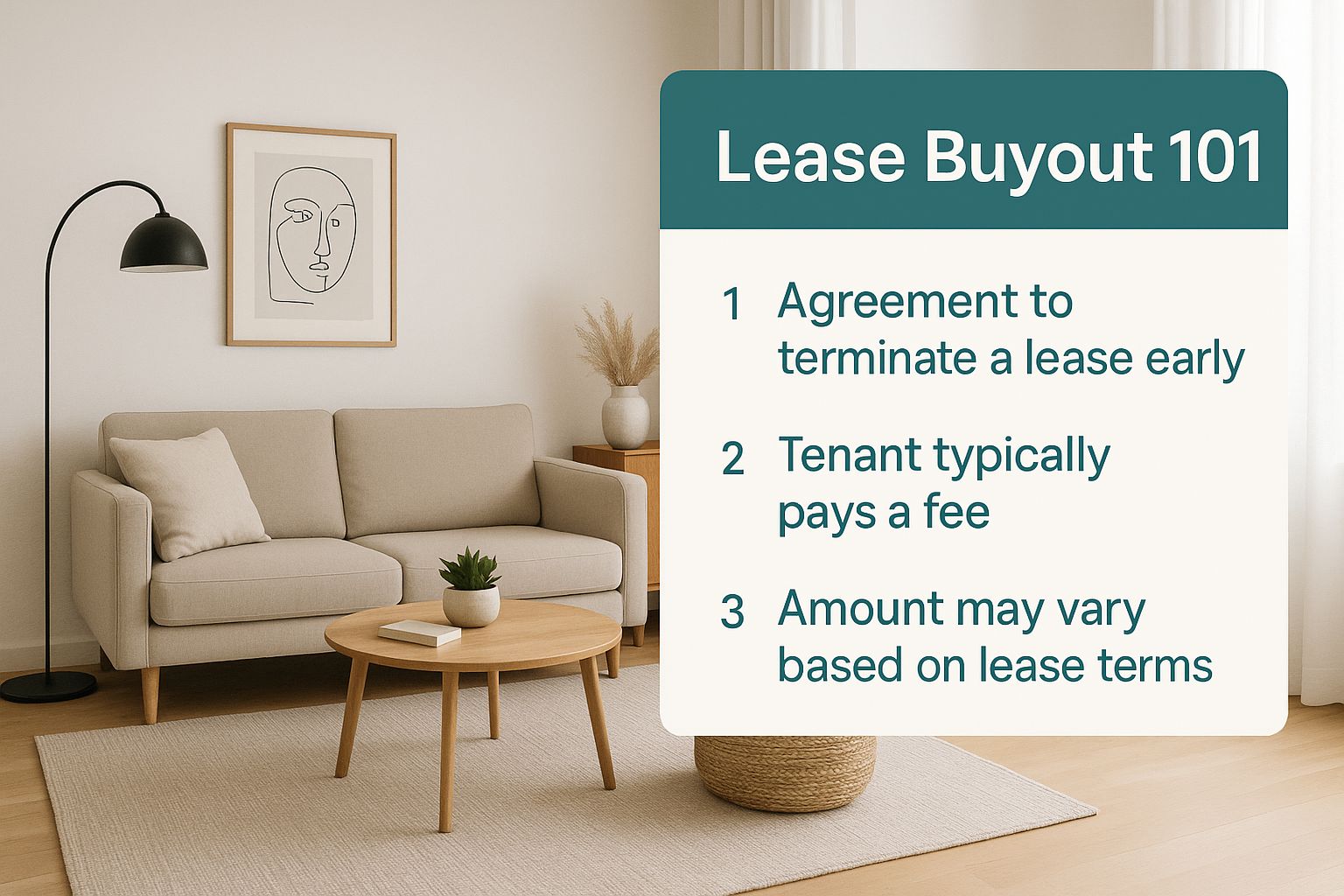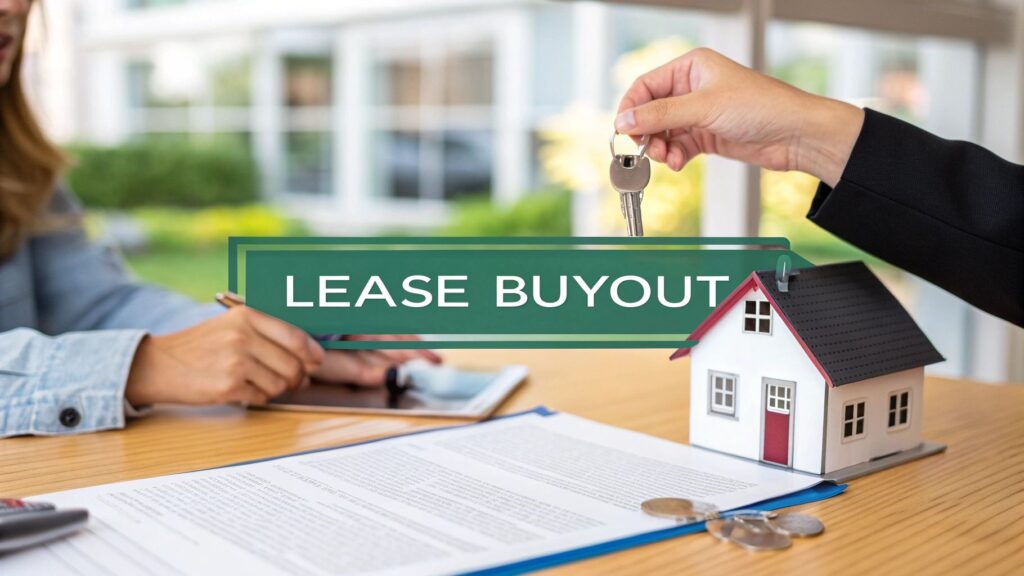So, you need to break your lease. It happens. Life throws curveballs—a new job in a different city, a chance to buy a home, or a personal situation that requires a move. Whatever the reason, you're faced with a binding legal contract. This is where an apartment lease buyout comes in.
Simply put, a lease buyout is a negotiated deal. You pay your landlord a one-time fee, and in return, they agree to tear up the lease, releasing you from all your responsibilities. It’s a clean break.
Understanding the Basics of an Apartment Lease Buyout
Think of it like this: your lease is a contract, much like one you’d have for your phone or cable service. If you want to cancel that service early, you usually have to pay an early termination fee. A lease buyout works on the same principle. You're paying a negotiated price to end the agreement without facing penalties or damaging your financial future.
It’s a formal, above-board solution for a tricky situation. It acknowledges that circumstances change and provides a structured way to part ways amicably.
This visual breaks down the core idea of a lease buyout.

As you can see, it's not a punishment for leaving early. It's a negotiation that, when done right, can work out well for both you and your landlord.
Why a Buyout Is Often the Safest Choice
When you're looking to get out of a lease, you might hear about other options, like subletting the apartment or, in a worst-case scenario, just packing up and leaving. But these alternatives are loaded with risk.
Take subletting. Even if your landlord agrees, you're often still on the hook. If the person you find stops paying rent or trashes the place, the landlord can—and likely will—come after you for the money. And simply abandoning the property? That's a recipe for disaster. It can lead to lawsuits, massive debt, and a trashed credit score that will follow you for years.
A formal buyout agreement is your "get out of jail free" card. It severs the contractual ties and protects your credit history, ensuring a clean break without the risk of future financial or legal surprises.
To really see the difference, let’s put these options side-by-side.
Lease Buyout vs Other Termination Options
When you need to end your lease early, you have a few paths you can take, but they are far from equal. Each comes with its own set of financial, legal, and credit-related consequences. This table breaks down what you're really looking at with each option.
| Method | Financial Cost | Legal Risk | Credit Score Impact | Landlord Agreement |
|---|---|---|---|---|
| Lease Buyout | Typically 1-3 months' rent paid upfront. | Low. A signed agreement releases you from liability. | None. The account is closed in good standing. | Required. You negotiate terms directly. |
| Subletting | Potentially low or none if you find a reliable tenant. | High. You remain responsible for rent and damages. | High risk if the sub-tenant defaults on payments. | Required. Landlord must approve the new tenant. |
| Abandonment | Extremely high potential costs from lawsuits and collections. | Very High. Landlord can sue for all remaining rent. | Severe negative impact from collections and judgments. | None. This is a direct breach of contract. |
As the comparison shows, while a buyout has an upfront cost, it's often the most predictable and secure way to protect yourself financially and legally. It’s a controlled exit, unlike the gamble you take with subletting or the guaranteed damage of abandonment.
Figuring Out the Real Cost of Your Buyout
A lease buyout isn’t free, but it's a whole lot more predictable than the financial chaos of just breaking your lease. The main number you’ll be looking at is the buyout fee, and your landlord has a specific way of calculating it.
Typically, landlords keep it simple. They'll ask for a fee that's equal to one to three months' rent. Think of this as their safety net—it gives them a financial cushion to cover their losses while they find someone new to move in.
So, let's say your rent is $2,000 a month. If your lease buyout clause says the fee is two months' rent, you're looking at a $4,000 payment. Once you pay that, you're officially free and clear of your lease obligations.
Don't Stop at the Main Fee
But hold on—that main fee isn't always the end of the story. Your lease is packed with details, and some of them might mention other costs tied to ending your lease early. You’ve got to comb through that fine print to see what else you might be on the hook for.
You could also be responsible for:
- Marketing and Re-letting Fees: Some landlords pass on the costs of advertising your old place and screening new tenants.
- Paying Back Concessions: Did you get a "one month free" deal when you signed? The buyout agreement might make you pay that back.
- Leftover Balances: Of course, any unpaid rent or utility bills need to be squared away before the deal is done.
Getting a handle on all these potential costs is key to budgeting correctly. For more on this, check out our guide to navigating apartment lease agreements for tips on spotting these clauses before you even sign.
How the Market Can Give You Negotiating Power
That final buyout number isn't always set in stone. The local rental market can actually give you a surprising amount of leverage to work out a better deal. If your city is seeing a boom in new apartment construction, landlords get a little more anxious about keeping their units full.
A high vacancy rate in your area is your best friend in a negotiation. If a landlord is staring down the barrel of an empty apartment for months, they'll be much more willing to accept a lower buyout fee just to get the situation handled.
This isn't just a theory; it's happening right now in major U.S. markets. A recent record-breaking wave of over 500,000 new apartments finished nationwide has flooded the market with options. This surge in supply has made property managers much more agreeable to offering deals—including flexible buyouts—to keep their vacancy rates down. Understanding how this new supply affects rent can give you a major advantage at the negotiating table.
Finding the Buyout Clause in Your Lease

Think of your lease agreement as the rulebook for your tenancy. Somewhere tucked inside that legal document is the key to ending your lease early—you just have to know where to look. Finding this specific section is always the first step in any apartment lease buyout.
Grab your lease and start scanning for headings like "Early Termination," "Buyout Clause," or "Reletting Fee." Landlords use these terms somewhat interchangeably, but they all point to the same thing: a pre-written plan for tenants who need to move out before their contract is up.
Decoding the Legal Language
Once you've found the right section, it's time to put on your detective hat. Don't just give it a quick glance. This part of your lease holds all the critical details that will dictate how much this costs and what you need to do. Getting this right is the difference between a clean break and a messy, expensive headache.
Here’s exactly what you need to look for:
- Required Notice Period: Almost every landlord will require advance written notice, usually somewhere between 30 to 60 days. Find that number and circle it. This is your most important deadline.
- Fee Calculation: How is the buyout fee determined? The clause should spell it out clearly. Most often, it’s a flat fee equivalent to one or two months' rent.
- Specific Conditions: Are there any other strings attached? Some leases might state that you forfeit your security deposit or require your rent payments to be perfectly up-to-date.
Think of this clause as a pre-approved exit plan. Following its terms exactly is the most straightforward path to a successful buyout, as it leaves little room for negotiation or disagreement.
What If There Is No Buyout Clause?
It can be a bit nerve-wracking to read through your lease and find absolutely nothing about early termination. But don't panic—it doesn't mean you're trapped. The absence of a buyout clause just means you're shifting from following a pre-set plan to opening a direct negotiation.
Without that clause, your landlord has no legal obligation to let you break the lease. This is where your people skills and strategy really come into play. You'll need to formally request a buyout and propose terms that work for both of you. Frame your departure as an opportunity for them, not a problem. You’re giving them a chance to find a new, long-term tenant, maybe even at a higher market rent. Your goal is to turn a tricky situation into a win-win.
How to Negotiate Your Lease Buyout
Alright, let's talk strategy. Negotiating your lease buyout is where you can save yourself a serious amount of money and stress. This isn’t a fight; it’s a business conversation where you’re looking for a solution that works for everyone. Done right, you can turn a potentially expensive mess into a clean break.
The trick is to frame this as a win-win. You're not just bailing on your lease. You're giving your landlord a golden opportunity to find a new, long-term tenant—maybe even at a higher rent—without the nightmare of eviction proceedings. Walking into that conversation with this perspective is everything.
Crafting Your Written Request
First things first: put it in writing. An email or a formal letter is the way to go. It shows you’re taking this seriously and, more importantly, it creates a record of your communication. A casual text message just won't cut it here. Your tone should be clear, professional, and cooperative.
Make sure your letter or email covers these key points:
- A Clear Statement: Get straight to the point. Clearly state that you need to terminate your lease early and are requesting a buyout.
- Your Proposed Move-Out Date: Give them a specific date. This provides a clear timeline for them to work with. A 30 to 60-day notice is pretty standard and shows consideration.
- The Reason for Leaving (Optional but helpful): You don't have to share your life story, but a brief, professional reason (like a job relocation) can go a long way. It adds a human touch and can build a bit of goodwill.
- An Offer to Cooperate: Make it clear you’re willing to help make the transition as smooth as possible. Phrases like, "I'm happy to work with you to ensure a seamless transition for the next tenant," can make a big difference.
Using Powerful Negotiation Levers
Once you've sent the request, it's time to prepare for the actual discussion. Having a few strong points—or "levers"—in your back pocket can dramatically change the outcome. Think about what you can offer that makes your landlord's life easier.
Remember, your landlord's primary goal is to minimize vacancy and financial loss. Any offer you make that helps them achieve this goal strengthens your negotiating position.
Consider bringing one or more of these to the table:
- Offer to Find a Replacement Tenant: This is your strongest card to play. If you can walk in with a pre-qualified applicant ready to sign a new lease, you've just solved your landlord's biggest headache. It's a game-changer.
- Be Flexible with Your Move-Out Date: Landlords love this. If you can time your move for the start of the busy rental season (usually spring or summer), they'll have a much easier time re-renting the unit. That flexibility is valuable.
- Highlight Excellent Tenant History: Casually remind them that you’ve been a model tenant—always paid rent on time, kept the place in great shape. A proven track record makes them far more likely to cut you some slack.
It also pays to know what's happening in the local rental market. When there are a lot of empty apartments available, landlords get nervous. The national vacancy index recently hit 6.6%, which means property managers in many areas are more motivated than ever to keep their units filled. You can discover more insights about how supply and demand are shaping the rental market and use that knowledge to your advantage.
Finalizing the Buyout Agreement
You’ve negotiated the terms and shaken hands with your landlord on your apartment lease buyout. It feels like you're at the finish line, but there's one critical step left. A verbal agreement, no matter how solid it seems, won't hold up legally. You absolutely must get everything down in a formal, written document.
This written agreement is your legal shield. It needs to spell out the final payment amount, the exact date you'll be vacating, and—this is the most important part—a release clause. This clause is the whole point of the buyout; it must clearly state that once you make that final payment, you are fully released from all future obligations under the original lease. Don't even think about signing without it.
The Pre-Signature Checklist
Before your pen ever touches that paper, scrutinize the document. Vague language creates loopholes, and loopholes can come back to haunt you. Treat this final review like you’re a detective looking for clues, making sure every detail is crystal clear and nothing is left to interpretation.
Here’s what you need to confirm:
- Final Buyout Amount: Is the exact dollar figure you agreed upon clearly stated?
- Move-Out Date: Does it specify the last day you have to hand over the keys?
- Release of Liability: Is there clear, unambiguous language cutting all your ties and responsibilities to the original lease?
- Security Deposit Return: Does it explain how and when you'll get your security deposit back?
Think of this signed document as the official receipt for your freedom from the lease. It’s your proof that the contract has been successfully terminated, protecting you from any future claims for rent or damages.
Once the agreement is signed by both you and your landlord, the rest is just logistics. Make the buyout payment using a method that leaves a paper trail, like a cashier's check or an online payment portal. Never use cash.
Finally, return the keys and do one last walkthrough with your landlord. This is your chance to document the apartment's condition together and smooth the way for getting your security deposit back. And if you're looking forward to what comes next, exploring beautiful apartments for rent in Boca Raton, FL can be an exciting start to your next chapter.
Common Questions About Lease Buyouts

Even when you have a solid plan, the idea of a lease buyout can bring up a lot of "what-if" questions. Let's tackle some of the most common concerns tenants have, so you can move forward with confidence.
Will an Apartment Lease Buyout Affect My Credit Score?
This is usually the first thing people worry about, and the good news is, a properly handled lease buyout should not negatively affect your credit score. Think of it as a formal, negotiated end to your contract—you're meeting your financial responsibility, not running from it.
Credit scores take a hit when you simply walk away from a lease and stop paying. That’s when a landlord might send your account to a collections agency, which does serious damage to your credit report. A signed buyout agreement is your golden ticket, proving you settled the account responsibly.
Can My Landlord Refuse a Lease Buyout?
Absolutely. If a buyout clause isn't already spelled out in your lease, your landlord is under no obligation to offer you one. A lease is a binding contract for its entire term, and they have every right to hold you to it.
But here’s the reality: their decision often hinges on the local rental market. If you live in a hot market where they can find a new tenant tomorrow (maybe even at a higher rent), they’re much more likely to play ball. Your best bet is to approach them with a professional request that frames the buyout as a win-win situation.
Key Takeaway: While a landlord can say no, a well-crafted request that makes their life easier has a strong chance of success. Your goal is to present a solution, not a problem.
Is a Lease Buyout Fee Tax Deductible?
For most people, a lease buyout fee is just a personal expense and is not tax-deductible. The main exception is for active-duty military members who are relocating due to a permanent change of station (PCS).
If you’re self-employed and the move is for business reasons, you might be able to deduct the fee as a business expense. But tax laws can be a minefield. It's always best to consult a qualified tax professional to get advice tailored to your specific financial situation.
What if I Cannot Afford the Buyout Fee?
Seeing a hefty buyout fee can be incredibly stressful, but don't panic. The number your landlord first gives you isn't always the final word. You have some room to negotiate.
Here are a few strategies to try:
- Request a Lower Amount: Open a polite conversation. Explain your financial constraints and propose a fee that you can realistically manage.
- Ask for a Payment Plan: See if your landlord is open to letting you pay the fee in installments over a couple of months instead of all at once.
- Offer to Find a Replacement Tenant: This is often the most powerful bargaining chip. If you can find a qualified person to take over your lease (a process known as assignment), your landlord might be willing to waive the buyout fee completely.
It’s also smart to look into local tenant rights. Some laws allow for breaking a lease without penalty under very specific circumstances, like domestic violence or documented, unsafe living conditions. Knowing your rights is key. For more general information, our guide with frequently asked questions about apartments in Boca Raton can also be a helpful resource.
Keep in mind that the bigger picture of the rental market influences these negotiations. With vacancy rates recently hitting a multi-decade high of 6.6%, landlords are often more willing to be flexible to avoid an empty unit. They have to balance keeping a unit filled with other strategic moves, like offering a buyout so they can renovate and attract a different type of tenant.
